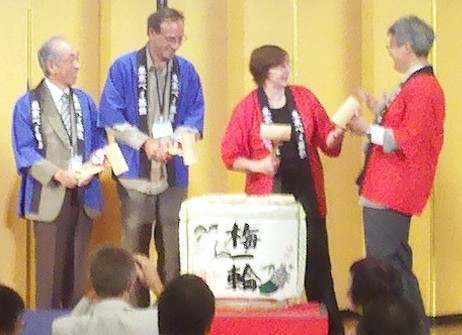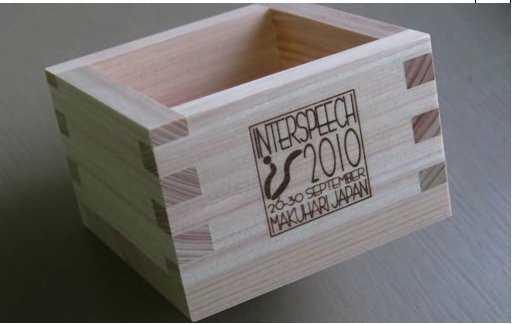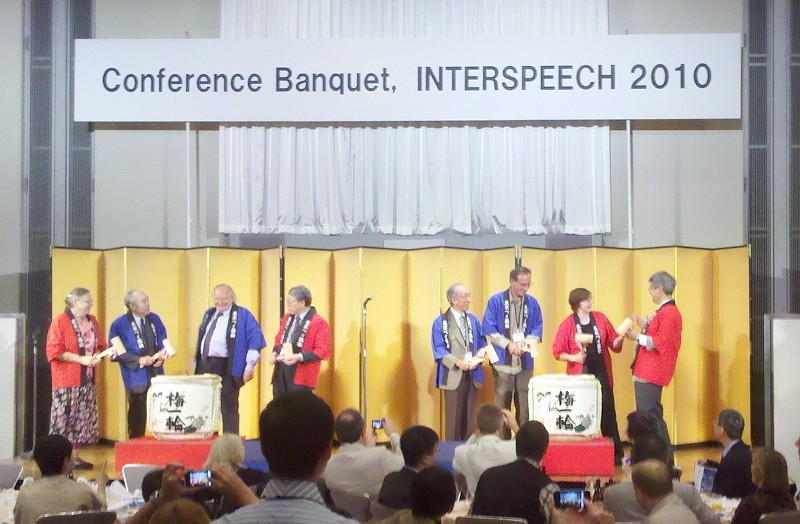Kagami-Biraki: InterSpeech kegger
« previous post | next post »
 According to the notes passed out at the InterSpeech 2010 banquet last night,
According to the notes passed out at the InterSpeech 2010 banquet last night,
Kagami-biraki (or kagami-wari) means "opening (or cracking) the mirror" where the "mirror" refers physically to the lid of the sake barrel and symbolically to circular mirrors depicting the sun and used as divine instruments in Japanese shinto religion. The kagami-biraki ceremony is performed at auspicious events, particularly at semi-formal and informal festivities commemorating beginnings. Participants often show camaraderie by wearing informal uniforms (happi shirts are common) instead of formal kimono.
Here are some dignitaries ceremonially breaking the barrel-lids on stage last night (sorry for the low-quality cell-phone photo):
The handout continues:
Normally taru (barrel) sake is served by using an auger to drill a hole on the side of barrel near its bottom and stopping it with a wooden plug so that desired quantities can be drawn while keeping the sake fresh. In kagami-wari however, because the barrel lid is broken and cannot be replaced, the sake must be wholly consumed during the party. This no-holds-barred gesture signals an all-you-can-drink occasion.
The untreated wooden barrels add a pleasant, cool, vigorous flavor that underscores the newness of the event. Virginity is important to the Japanese psyche. Using brand-new items was intended originally for gods and guests.
Today, most restaurant chopsticks are broken in half immediately before use, and unlacquered wood utensils are the most cherished.

The "cups" distributed for drinking the sake were boxes freshly made out of some highly aromatic wood, perhaps cedar, which added an intense aroma and flavor.
I'll report later on some of the research results that I learned about at the meeting. But drinking sake out of cedar-wood boxes, under a religious obligation to finish the keg, was certainly one of the more striking ideas that I've encountered so far.

groki said,
September 29, 2010 @ 5:39 pm
sounds delightful–though InterSpeech might have been a little slurred by evening's end!
Rubrick said,
September 29, 2010 @ 7:22 pm
Under the circumstances, I'm not sure "dignitaries" is quite the right word.
Bellhalla said,
September 29, 2010 @ 8:22 pm
You sure that notes were the only thing passed out by the end of the evening?
Bobbie said,
September 29, 2010 @ 11:09 pm
Thanks, but I'll pass up the opportunity to drink something flavored with cedar. If it is anything like the Greek retsina, (which tastes like turpentine to me), I could live without it!
John Chew said,
September 29, 2010 @ 11:55 pm
It's not cedar, it's ひのき (hinoki, Chamaecyparis obtusa), a species of cypress. Here's one manufacturer's web page that gives more information about masu boxes (which used to be a standard measure, enough rice to feed a person for a day, or enough sake to thoroughly celebrate an occasion, I guess), in Japanese.
On a tenuously related note (only in that you talk a lot about headlines here, and this one is East Asian), CBC Radio's news programme "As It Happens" this evening led off a story about North Korean succession plans with the audio headline "Un Likely Candidate", referring to Kim Jong-un.
Flipper says... said,
September 30, 2010 @ 10:26 am
Off topic, but have any language loggers seen this from the BBC's 'Earth News' http://news.bbc.co.uk/earth/hi/earth_news/newsid_9045000/9045389.stm
The paper in question is at http://onlinelibrary.wiley.com/doi/10.1111/j.1439-0310.2010.01828.x/abstract
Any thoughts?
James C. said,
September 30, 2010 @ 11:37 am
The flavor of hinoki + sake is heavenly. It’s nothing like retsina. Instead it’s light, flowery, and invigorating. Although like most flavours and smells there really aren’t any good adjectives to describe it.
sep332 said,
September 30, 2010 @ 12:44 pm
@James C.
Well not in English anyway. For example, English has no word for umami :-D
fs said,
September 30, 2010 @ 3:20 pm
@John Chew: You forgot to link anything…
David J. Littleboy said,
October 2, 2010 @ 12:10 pm
"(which used to be a standard measure, enough rice to feed a person for a day, or enough sake to thoroughly celebrate an occasion, I guess)"
"Masu" is a generic term for wooden measures of several standard sizes. The size used for sake may or may not be enough to feed a person for a day (as the Japanese think it is), but at 0.18 liters it's nowhere near enough to "thoroughly celebrate an occasion", even if you come from a family of radical teetotalers as I do. (Interestingly, it's illegal in Japan to sell things in the masu units, although cheap gut-rot sake in 180 ml bottles is widely sold.) I play in a small (only 12 of us) amateur big band that plays at parties of various sorts, and sake barrels often get cracked. We usually don't get any, though. :(